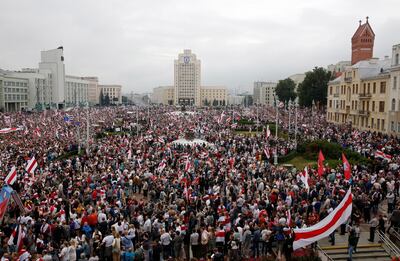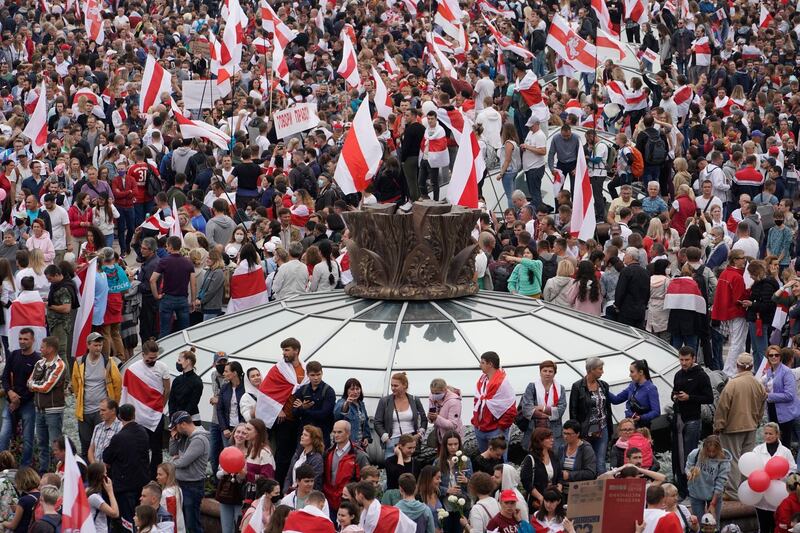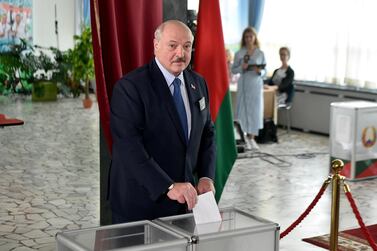More than 100,000 protesters demanding the resignation of Belarus’ president rallied on Sunday in a vast square in the capital, keeping up the massive outburst of dissent that has shaken the country since a disputed presidential election two weeks ago.
Sunday’s demonstration overflowed Minsk’s sprawling seven-hectare Independence Square. There were no official figures on crowd size, but it appeared to be 150,000 people or more.
Until now, the police have handled crowd control on their own, but the defence ministry said it would take on security around national memorials and issued a direct warning to protesters.
The ministry said that memorials, specifically ones to those killed in the Second World War, were holy sites that must not be desecrated.
“We categorically warn: any violation of peace and order in such places – you will have the army to deal with now, not the police,” it said in a statement. “We, soldiers, will not allow these places to be desecrated, there can be no fascism there!”

The interior ministry issued its own statement saying that any unsanctioned protests would be illegal. It said 22 people had been arrested on Saturday when smaller protests took place in 55 towns and cities.
Dozens of police prisoner transport vehicles were parked on the fringes of Sunday’s protest, but police made no immediate efforts to break up the gathering.
Earlier this month, about 7,000 people were arrested, many of them beaten with clubs or wounded by rubber bullets, in the protests after the August 9 election that officials say handed President Alexander Lukashenko a sixth term in office.
Protesters say the election results, in which Mr Lukashenko reportedly received 80 per cent of the vote, are fraudulent.
The size and duration of the protests are unprecedented for Belarus, a former Soviet republic of 9.5 million people which Mr Lukashenko has ruled for 26 years.
The 65-year-old leader has repeatedly blamed western interference, claimed the protests were backed by the US and accuses Nato of building up troop concentrations in Poland and Lithuania on Belarus’ western border, which the alliance denies. He also said that Russian President Vladimir Putin was willing to offer security assistance to his government to quell the protests if he asked for it.
Weariness over the country’s deteriorating economy and Mr Lukashenko’s dismissal of the coronavirus pandemic appear to have galvanised opponents.
Another enormous crowd turned out for a protest a week ago and daily demonstrations have taken place since the vote. Several of the country’s factories have been hit with protest strikes by workers fed up with government polices. Those strikes not only threaten the already ailing economy, but show that opposition to Mr Lukashenko extends beyond educated white-collar circles and into his traditional blue-collar base.
“Belarus has changed. Lukashenko has been able to unify everybody, from workers to intelligentsia, in the demand for change,” said protester Slava Chirkov, who attended Sunday’s demonstration with his wife and son.
They held a sign declaring “Lukashenko, your milk has gone sour,” referencing Mr Lukashenko’s former job as the director of a Soviet-era collective farm.
Mr Lukashenko’s main election challenger, Svetlana Tikhanovskaya, fled to Lithuania the day after the election. Several other possible challengers fled the country even before the poll.
An opposition Co-ordination Council was created last week to develop a strategy for a transition of power, but authorities in Belarus have opened a criminal probe into its formation.








